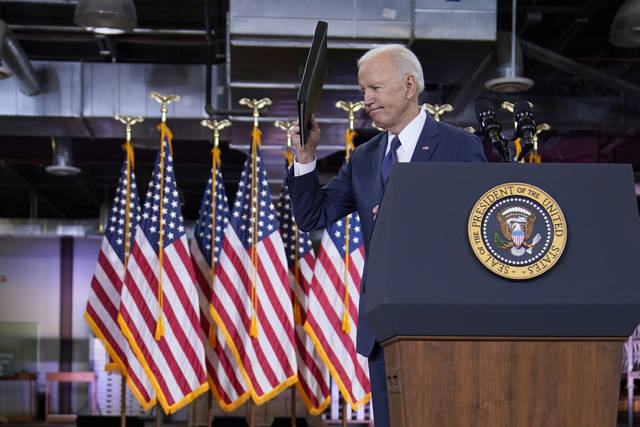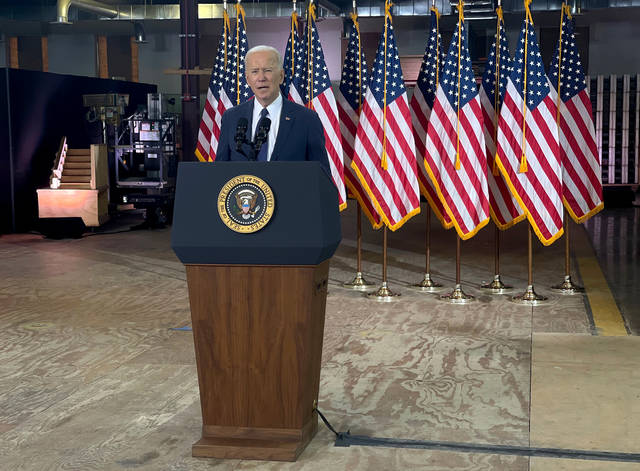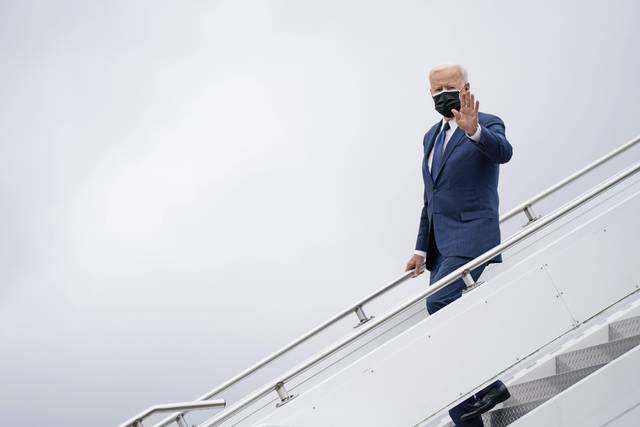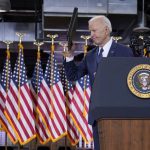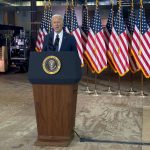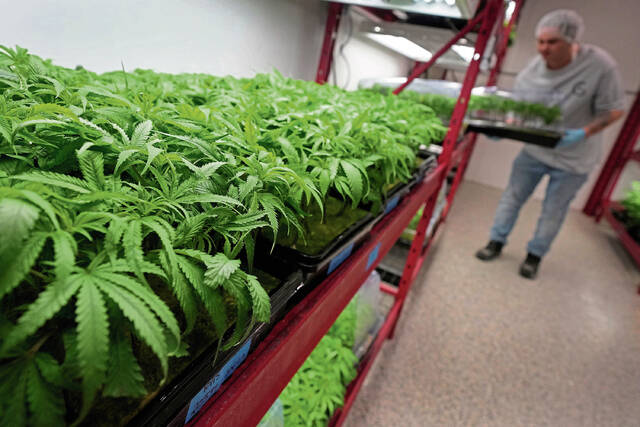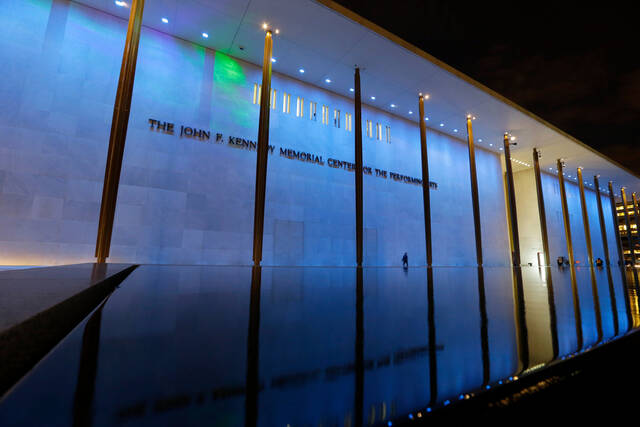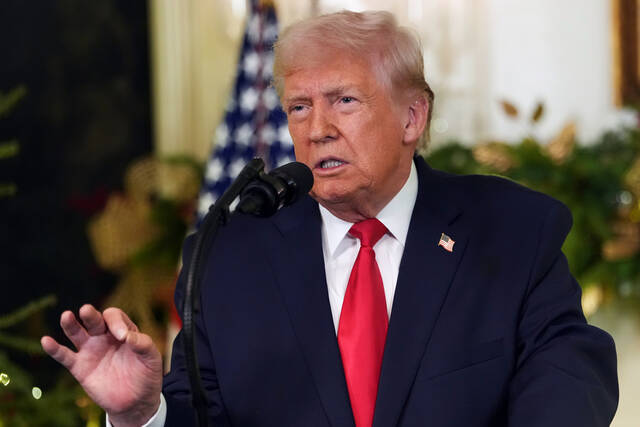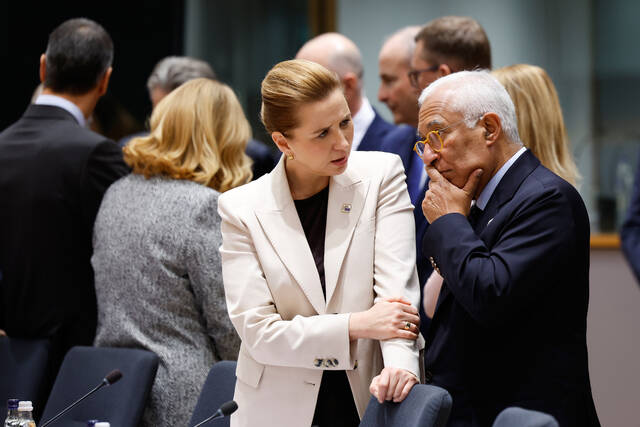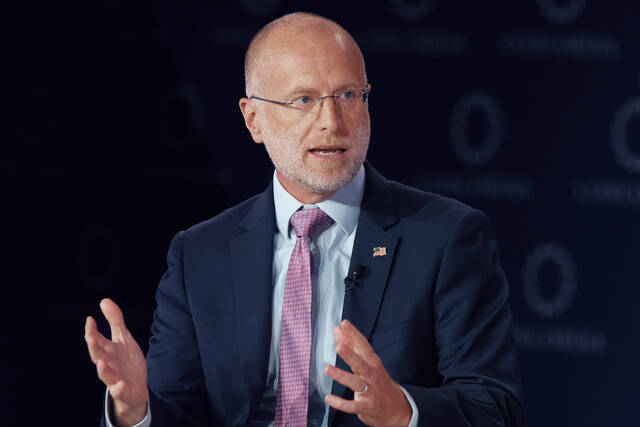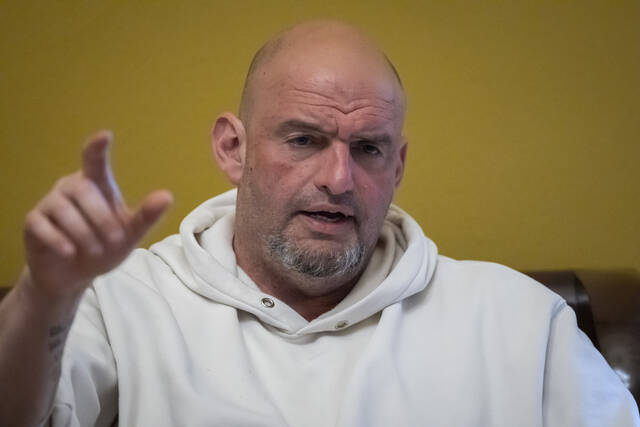President Joe Biden traveled to suburban Pittsburgh on Wednesday afternoon to unveil a $2.3 trillion plan intended to revive the nation’s pandemic-battered economy through new infrastructure and transportation-related projects around the country.
Biden deemed his newly released American Jobs Plan to be the greatest American investment “since we built the interstate highway system and the space race decades ago.”
“It’s big, yes. It’s bold, yes. And we can get it done,” Biden said. “We can’t delay. We can’t delay another minute. It’s long past due. … Our infrastructure is crumbling.”
Flanked by a banner reading “Build Back Better,” Biden addressed a small gathering of invited guests, politicians,and news reporters, seated in chairs spaced more than 6 feet apart inside a large warehouse at the Carpenters Training Center in Collier.
“Two years ago I began my campaign here in Pittsburgh, saying I was running to rebuild the backbone of America. And today I return as your president to lay out the vision of how I believe we do that,” Biden said early in his remarks, which began around 4:40 p.m. and lasted about a half hour. “The American Jobs Act will modernize 20,000 miles of highways, roads and main streets that are in difficult, difficult shape right now. … We’ll also repair 10,000 bridges … and (fund) desperately needed upgrades to unclog traffic, keep people safe and connect our cities, towns and tribes.”
Biden: “The American Jobs Act will modernize 20,000 miles of highways, roads and main streets that are in difficult, difficult shape right now. …
“We’ll also repair 10,000 bridges, desperately needed upgrades to unclog traffic, keep people safe and connect our cities, towns..” pic.twitter.com/9toLMzNdtp
— Natasha Lindstrom (@NewsNatasha) March 31, 2021
Biden called on Republicans who object to the package — and particularly, how it will be funded — to work across the aisle to get the money flowing to critical projects nationwide.
GOP accuses Biden of ‘spending binge’
Republican leaders have balked at the price tag of Biden’s package and objected to funding it through higher taxation on corporations.
“We can and should do more to rebuild our nation’s physical infrastructure,” U.S. Sen. Pat Toomey, R-Lehigh Valley, said in a statement responding to Biden’s speech. “… That means funding these improvements through a negotiated combination of user fees and reductions in wasteful, outdated and duplicative government spending.”
Following pandemic-spurred relief packages, Toomey cited the need to lower federal spending, not increase it, because “the economic recovery is well underway.”
He objected to undoing any changes to the tax code made by the 2017 tax cuts under the Trump administration — which Toomey credits with helping “create the best American economy of my lifetime.”
To finance the plan, Biden touched on three options: raising the corporate tax, creating a global U.S. corporation minimum tax of 21% and increasing IRS enforcement of wealthy Americans.
Biden says he would expect the package to decrease the federal deficit over the long term by not letting existing infrastructure problems get more costly.
“Let me be clear: These are my ideas on how to pay for this plan,” Biden said. “If others have additional ideas, let them come forward. I’m open to other ideas — so long as they do not impose any tax increase on people making less than $400,000.”
Among the limited number of guests and Democratic elected officials at the presidential visit was Gov. Tom Wolf, who has tasked state lawmakers and a newly formed transportation funding commission to come up with separate, statewide investment plans by August.
Wolf described the proposed federal infrastructure infusion as “critical.”
Pennsylvania @GovernorTomWolf, moments after listening to Biden’s remarks in Collier, described proposed federal infrastructure infusion as “critical.”
“This is one of the problems we all have: We love to use things, we love to consume things.
“None of us wants to pay for it.” pic.twitter.com/QYQSXB70Zg
— Natasha Lindstrom (@NewsNatasha) March 31, 2021
“This is one of the problems we all have: We love to use things, we love to consume things. None of us wants to pay for it,” Wolf said.
‘We have to get it done’
Labor leaders at the event included Pittsburgh Federation of Teachers President Nina Esposito-Visgitis and Thomas Conway, international president of the United Steelworkers. Also in attendance were Allegheny County Executive Rich Fitzgerald; U.S. Reps. Conor Lamb, D-Mt. Lebanon, and Mike Doyle, D-Forest Hills; and Sen. Bob Casey, D-Scranton.
“In addition to laying out a detailed plan to upgrade our roads and bridges, President Biden has put forth common sense ideas for how to finance these investments,” Casey said. “Congress should quickly move forward on this legislation.”
Lamb pointed out that Biden has “had Republican congressmen over to the White House before I’ve been there.”
“He’s making an effort to really bring people in and hear their ideas … and that’s very different from the previous administration,” Lamb said. “But he’s not going to allow them to slow us down, either.”
Biden said that there’s “no reason why it can’t bipartisan.”
“I’ll have a good-faith negotiation with any Republican who wants to get this done,” Biden said. “But we have to get it done.”
Going beyond ‘traditional infrastructure’
In anticipation of Biden’s trip to Pittsburgh, a business and labor coalition called Pittsburgh Works Together sent a letter to Pennsylvania’s two senators and 18 representatives, along with lawmakers in West Virginia and Ohio.
“Certainly, investment in high-profile traditional infrastructure areas such as roads and bridges, and in the case of Pittsburgh and other river communities, locks and dams, is important,” the Pittsburgh Works Together letter said. “But there are other crucial investments that are needed to maximize opportunity and equity.”
Among non-traditional infrastructure priorities cited in the group’s letter: repairing water and sewer systems so the burden isn’t limited to ratepayers; building a federally funded plan for electric vehicle charging stations; and expanding broadband access to rural communities.
Similar goals are folded into Biden’s proposed legislation, which is far-reaching and would invest not only in capital projects but also technology, research and development.
The plan calls to allocate $650 billion toward broadband, clean water, the electric grid and affordable housing.
Eradicating lead from America’s water and investing in storm water systems are part of the plan, and Pittsburgh Mayor Bill Peduto says could be good news for the city’s water supply. The Pittsburgh Water and Sewer Authority set a goal of removing all lead pipes from its system by 2026.
Eradicating lead from America’s water & investing in storm water systems are part of Biden’s “American Jobs Plan.”
Mayor @billpeduto says that if passed, the federal funding package could speed up #Pittsburgh Water & Sewer Authority efforts to fix/replace aging infrastructure. pic.twitter.com/a97oWCBqRt
— Natasha Lindstrom (@NewsNatasha) March 31, 2021
“With this investment, we’ll be able to push that date up, I don’t know how many years, but we are ready tomorrow to be able to hire more crews to be able do more and to be able to get all the lead out of our system within just a few years,” Peduto said. “Even with the lead out, we still need to upgrade the facilities and the mechanics of the entire system. … There’s probably close to $1.2 billion worth of upgrades that are needed.”
Biden’s plan: By the numbers
The plan calls for investing about $2.3 trillion over an eight-year period, with plans to account for the cost over 15 years and, ideally, simultaneously reduce the long-term debt by investing in the most critical, high-need projects before they get costlier.
Among more than $600 billion in physical infrastructure and transportation-related investments, Biden’s proposal includes:
• $115 billion for improving roads, bridges and highways;
• $85 billion to modernize public transit;
• $80 billion to reduce Amtrak’s repair backlog and improve passenger and freight rail safety;
• $174 billion to encourage investment in electric vehicles; and
• $111 billion to replace water pipes and upgrade sewers.
In coming weeks, Biden plans to present a second piece to his initiative, the “American Families Plan,” a $2 trillion package that will focus on child care, family tax credits and programs that support families.


